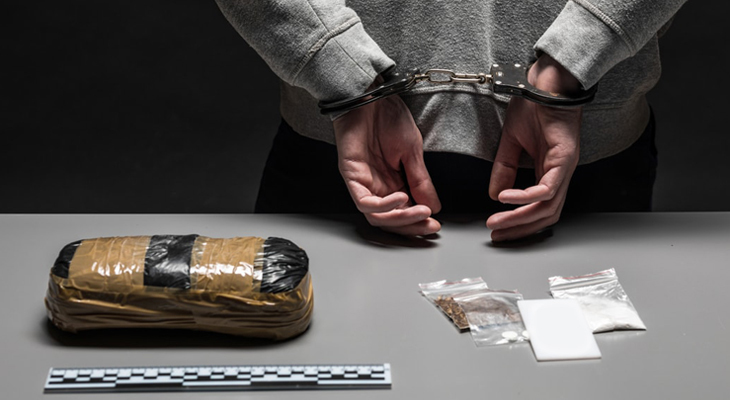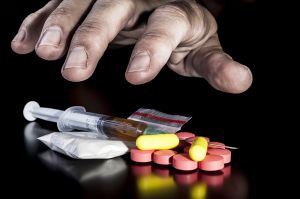
Both drug possession and drug trafficking charges start with someone arrested for having drugs in their possession. However, the similarities end there. Since defendants and their families often get confused on the differences between drug possession and drug trafficking (also known as intent to deliver) here is some useful information to learn.
What is drug possession?
In Wisconsin possession of any amount of controlled substance is prohibited under Wisconsin criminal law. Operating a motor vehicle with any amount of these substances in your blood system are also prohibited. These illegal substances can include marijuana, heroin, cocaine, methamphetamine, LSD, and ecstasy. Having a controlled substances in your possession, vehicle, purse, etc. without a valid prescription is also considered illegal possession.
Wisconsin classifies controlled substances into five different “schedules,” with Schedule I having the highest potential for abuse and Schedule V having the lowest.
- Schedule I includes LSD, PCP, heroin and THC (the hallucinogenic substance in marijuana).
- Schedule II includes cocaine, opium, codeine, morphine, amphetamines, and methadone.
- Schedules III, IV, and V include substances for which there is an accepted medical use and a lower potential for abuse. Two commonly known “date rape” drugs are included in these categories.
 You can be charged with drug possession even if the substance was not found on you. In drug crime cases, there are two possible types of possession: actual possession and possession.
You can be charged with drug possession even if the substance was not found on you. In drug crime cases, there are two possible types of possession: actual possession and possession.
- With actual possession, you must have physical possession of the controlled substance in your hand, in your pocket or somewhere on your person.
- With constructive possession, however, the drugs do not need to be on your person in order for you to face charges. If the state can establish that you knew where the drugs were located and had the intention of exercising some type of control over them in the future, you could be charged with drug possession.
Wisconsin imposes heavy penalties for possession of controlled substances. Penalties depend on the drug or how it is categorized, and this is something that needs to be discussed with an experienced criminal defense attorney. Here are the penalties for these controlled substances:
- THC: For a first conviction, a fine up to $1,000 or imprisonment up to six months, or both, may be imposed. Any second or subsequent conviction is a Class I felony, which carries a fine of up to $10,000 or imprisonment up to 3 1/2 years, or both.
- LSD, PCP, Methamphetamine, Amphetamine, or Psilocybin: On a first conviction, the penalty includes a fine up to $5,000, or imprisonment up to one year, or both. A second or subsequent conviction is a Class I felony with possible penalties of up to $10,000 in fines and up to 3 ½ years in prison, or both.
- Schedule I or II Narcotics: Possession of these types of drugs is a Class I felony, punishable by up to $10,000 in fines or up to 3 ½ years in prison, or both.

What is drug trafficking (intent to deliver)?
Typically, if a larger amount of illegal substances is found, the offense may be considered by law enforcement and the state to be a felony “possession with intent to manufacture, distribute, or deliver.”
To prove possession with intent to deliver, the state first needs to prove knowing possession. If the prosecution can prove knowing possession of a controlled substance, the next question is whether it can prove intent to deliver the controlled substance. Intent to deliver is nothing more than the intent to transfer or attempt to transfer the controlled substance from one person to another. The state does not need to prove that the intended transfer was for profit.
The penalties for delivery, possession with intent to deliver and drug trafficking are much greater than possession. They are also always felony charges. As with possession charges, these penalties vary depending on the substance and amount. For example, looking at cocaine, the penalties range from $25,000 to $100,000 in fines and 12.5 years to 40 years in prison depending on the amount you're carrying.
All drug charges are very serious and you need to hire an experienced and knowledgeable criminal defense attorney to help you navigate the complexities and get you the best possible result. At Jones Law Firm we have with decades of experience in drug cases . Contact us today to set up a free consultation. If you have been charged with drug possession, distribution, or trafficking in state or federal court please contact us by text or phone at (414) 774-6000 or email at laura@jlfwisconsin.com anytime.
*Any articles in the Libra or posted by Jones Law Firm LLC are not legal advice for a particular client or situation. Further no attorney-client relationship is intended or created with this post.*

